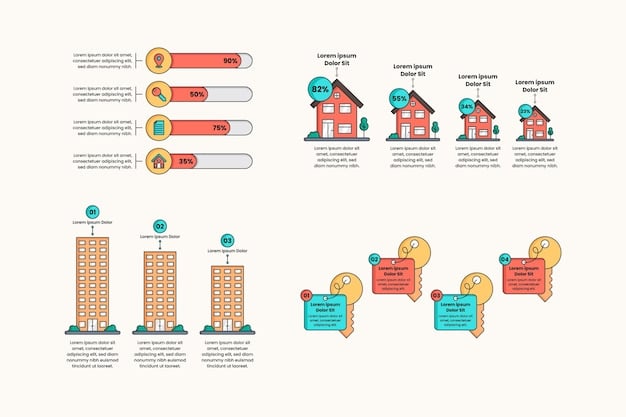Income REITs: Navigating Interest Rate Hikes in 2025

Income REITs face potential challenges in 2025 due to anticipated interest rate hikes, which could impact their profitability and dividend yields, requiring investors to carefully analyze their portfolios and consider strategies to mitigate risks.
Navigating the world of real estate investment trusts (REITs) can be complex, especially when considering the interplay between income REITs: understanding the impact of interest rate hikes in 2025. As we approach 2025, anticipating and understanding the consequences of potential interest rate adjustments becomes paramount for investors seeking stable income streams.
Income REITs Explained
Income REITs, or real estate investment trusts, are companies that own or finance income-producing real estate across a range of property sectors. These REITs allow investors to earn a share of the income produced from these properties without actually having to go out and buy, manage or finance the properties themselves.
Types of Income REITs
There are several types of income REITs, each focusing on different property sectors. Understanding these different types can help investors diversify their portfolios and target specific investment goals.
- Commercial REITs: Invest in office buildings, retail spaces, and industrial properties.
- Residential REITs: Focus on apartment buildings, student housing, and manufactured homes.
- Healthcare REITs: Invest in hospitals, nursing homes, and medical office buildings.
- Mortgage REITs: Finance real estate by purchasing or originating mortgages and mortgage-backed securities.
These REITs generate income through rents and capital appreciation by leasing space and then distributing that income to shareholders through dividends. This structure provides a steady income stream, making them a popular choice for investors seeking regular payouts. This model is particularly attractive when interest rates are stable.
Interest Rate Hikes: The Basics
Interest rate hikes occur when central banks, like the Federal Reserve in the United States, increase the target range for the federal funds rate. This rate affects the cost at which banks lend money to each other overnight. When the federal funds rate increases, other interest rates throughout the economy tend to rise as well.
Impact on the Economy
Higher interest rates can have several effects on the economy. They can slow down economic growth by making it more expensive for businesses and consumers to borrow money. This can lead to reduced spending and investment.

Conversely, higher interest rates can also help to control inflation. By increasing borrowing costs, the amount of money available in the economy is reduced, which keeps demand for goods and services in check.
The Federal Reserve typically raises interest rates when the economy is growing too quickly and inflation is rising above its target level. The goal is to strike a balance between controlling inflation and maintaining sustainable economic growth.
How Interest Rate Hikes Impact Income REITs
Interest rate hikes can have a multifaceted impact on income REITs. Understanding these impacts is essential for investors to make informed decisions and manage their portfolios effectively.
Increased Borrowing Costs
One of the most direct impacts of interest rate hikes is increased borrowing costs for REITs. REITs often rely on debt financing to acquire and develop properties.
When interest rates rise, so does the cost of this debt, which can reduce a REIT’s profitability. This can squeeze profit margins, potentially leading to lower dividend payouts for investors.
Decreased Property Values
Rising interest rates can also lead to decreased property values. As borrowing becomes more expensive, the demand for real estate may decline, causing properties to depreciate. This is especially true for highly leveraged REITs that are highly dependent on debt financing.
Lower property values can, in turn, impact a REIT’s net asset value (NAV), which is a key metric investors use to assess the financial health of a REIT. A decline in NAV can make a REIT appear less attractive to investors.
Interest rate increases can negatively affect revenue, investment and the value of the underlying assets, making them less enticing to both institutional and individual investors.
Income REIT Performance During Previous Rate Hikes
Examining how income REITs performed during previous periods of interest rate hikes can provide valuable insights into what we might expect in 2025. Historical data can reveal patterns and trends that help investors anticipate future performance and adjust their strategies accordingly.
Analyzing Historical Data
Historical data shows that the relationship between interest rates and REIT performance is not always straightforward. In some instances, REITs have underperformed during periods of rising rates, while in others, they have remained resilient or even outperformed.

Factors such as the overall health of the economy, the specific property sectors in which a REIT invests, and the REIT’s management strategies can all influence its performance during rate hikes.
While REITs can be affected by interest rate increases, there are defensive measures that can be taken to lessen the impact. The REITs’ strategy of increasing rents can help offset some of the higher costs that are brought on by the increased interest rates.
Strategies for Investors in a High-Rate Environment
Given the potential challenges posed by interest rate hikes, investors in income REITs can employ several strategies to mitigate risks and protect their portfolios.
Diversification
Diversifying across different types of REITs and property sectors can help to reduce the impact of rate hikes. By spreading investments across various sectors, investors can minimize the risk associated with any single sector’s underperformance.
- Invest in REITs with strong balance sheets and low debt levels
- Consider REITs with shorter-term debt maturities to benefit from potential future rate cuts.
- Look for REITs that have a history of successfully navigating economic downturns and rate hikes.
This can smooth out returns and provide a more stable income stream, even during periods of market volatility.
Future Outlook for Income REITs in 2025
Looking ahead to 2025, the outlook for income REITs will depend on several factors, including the pace and magnitude of interest rate hikes, the overall health of the economy, and the specific strategies employed by REITs to adapt to the changing environment.
Potential Scenarios
One potential scenario is that the Federal Reserve will implement a series of gradual rate increases, which could lead to a moderate slowdown in economic growth and a modest decline in property values. In this scenario, REITs with strong balance sheets and well-managed portfolios may be able to weather the storm and continue delivering stable income to investors.
Another scenario is that the Federal Reserve will be more aggressive in raising rates, which could trigger a more severe economic downturn and sharply lower property values. In this scenario, REITs with high debt levels and exposure to struggling property sectors may face significant challenges.
The effect of the interest rates will be felt differently in different industries. For example, an increase in interest rates can actually boost the income for mortgage REITs, which derive revenue from net interest rate margins.
| Key Point | Brief Description |
|---|---|
| 📈 Interest Rate Impact | Hikes increase borrowing costs for REITs. |
| 🏠 Property Values | Rising rates can decrease real estate demand and values. |
| 🛡️ Investor Strategies | Diversification and careful REIT selection are key. |
| 🔮 Future Outlook | Depends on rate hikes, economy, and REIT strategies. |
Frequently Asked Questions
▼
Income REITs are companies that own or finance income-producing real estate. They allow investors to earn a share of the income from these properties without direct management.
▼
Interest rate hikes increase borrowing costs for REITs, potentially decreasing property values and reducing profitability. This can impact dividend payouts for investors.
▼
Investors can diversify their REIT holdings, invest in REITs with low debt, and focus on those with shorter-term debt maturities to adapt to rising rates.
▼
REITs with strong balance sheets, lower debt levels, and properties in high-demand sectors may be less affected by interest rate increases.
▼
The future depends on the pace of rate hikes, economic health, and REITs’ adaptive strategies. Gradual rate increases may have moderate impacts, while aggressive hikes could pose significant challenges.
Conclusion
In conclusion, understanding the interplay between income REITs and interest rate hikes is crucial for investors in 2025. By staying informed, diversifying portfolios, and adapting to changing market conditions, investors can navigate potential challenges and continue to generate stable income streams from REIT investments.





